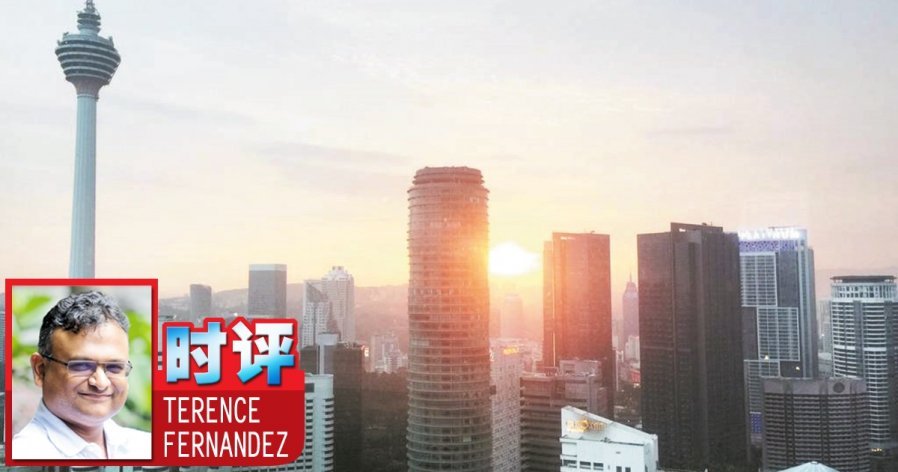9月往往是一个民族主义和爱国主义高涨的月份。8月31日国庆日的热潮可持续至我们热切期待著的另一个全国庆典,纪念马来西亚成立的9月16日——马来西亚日。
我们也可趁这良好的时机,提醒各方和年轻一代,以及那些忘记历史的人,无论是有意还是无意的,马来西亚是在各族不分宗教背景下建立起来的。
例如,英国人拒绝在没有少数民族华人和印裔的领导人下,谈判马来亚的独立。英国人就曾让东姑阿都拉曼和敦陈修信空手而归,并要他们也把敦善班丹带到伦敦参与独立会谈。
无论如何,是东姑阿都拉曼将所有族群凝聚在一起,并说服巫统的一些人,多元种族联合政府,才是管理多元种族的马来亚之正确和有效方式。
依种族宗教自我识别
现在很少有人认识到马来亚马来国民党(PKMM),这个由阿末布斯达曼(Ahmad Boestamam)领导的马来政党,在1945年印尼宣布独立后,第一个提出马来亚独立概念的马来政党。而巫统是于1946年6月才成立的。或者也可以说,来自华人大亨的资金,对于国家的独立,扮演著必不可少的角色。
但这不是要展示谁的功劳。尤其在这个国庆日和马来西亚日的季节,似乎有许多人受到反面的影响。这似乎反映了一些马来西亚人的丑陋一面,他们宁愿根据种族和宗教信仰来识别自己,而不是我们一直自豪认同的集体身份──马来西亚人。
9月14日,马来西亚日前两天的穆斯林团结集会,就是一个令人不安的论述证明。加上在8月─默迪卡月期间,爪夷书法的争论,以及当下的购买“穆斯林产品优先”运动,已错误地或故意地标签为抵制非穆斯林产品的运动。
接著,伊斯兰机构──伊斯兰发展局(JAKIM)宣布禁止穆斯林和非穆斯林一起祈祷促进宗教间的团结和理解事件。然而,JAKIM对于其每年接获从纳税人(包括非穆斯林)税收而来的10亿令吉拨款,却从没有任何疑虑。
就个人而言,因某宗教传教士课题引起的争论,让我在国庆日前夕失去了一群朋友。这些友人,一些是我已经认识了40年的朋友,他们曾在我的族群和宗教被欺压时为我说话。
人民决定大马论述
但是,那名外国逃犯却能令我们40年的友谊决裂,因为在去年5月9日我投票支持的政府和政治人物的帮助和怂恿下,他将自己提升到先知的水平。
许多人会安慰我们说,这不代表大多数的人。大多数马来西亚人依然认为各族的团结协作将可带来更大的成就。这将比偏执狂,沙文主义和种族主义更好。
也许在民族认同上,我们需要指导方向。马来西亚人身份的认同,并不意味著就会削弱马来人、华人或印裔特征。
我们将继续支持伊斯兰作为联邦的宗教,同时也捍卫其他宗教的实践;虽然有些人可能对马来主权有所不满,但我们对马来人的领导没有问题。我们承认中文是全球使用最多的语言,同时也应该掌握英语。
然而,尽管有著这种自信,但目前的主流论述却是种族的冲突和分化。如果我们依赖政治人物来改变这种论述,那么我们就注定会失败,因为不管是国阵和希盟都是这些论述煽动者。人民有责任决定自己的马来西亚论述,即马来西亚的多元,才是蓬勃发展要素。
记得有一位马来朋友陪我回吉兰丹家乡观察时,发现那里各族群相处得很好。“这是因为当地人说一种共同语言”,他说,所指的就是,连当地华人和印裔也使用吉兰丹马来方言。
让马来语成沟通桥梁
或许,首先我们应该努力让马来语作为团结各族的语言。一些年轻的马来西亚人无法掌握好国语,这是不能接受的。或许这可成为董总推动的议程之一,以加强族群和谐的关系;或那些反对在泰米尔学校增加国文课的印裔或泰米尔组织,也应考量的建议。
也许媒体和广告平台不应该接受“仅限穆斯林”或“华人优先”的分类广告。也许要求包括官联和上市的公司或企业,应拥有健全的族群结构。
10年前提出的《国民和谐法》,就是要促进种族包容和解决族群排斥问题。但是,如果我们需要立法来促进国民的包容和团结,这将是令人悲哀的,也不是当年建国领袖所欲见的。
《马来西亚日身份危机》(A Malaysia Day identity crisis)原文:
September is usually a period of heightened nationalism and patriotism. The euphoria of the National Day celebrations on Aug 31 continues into the coming weeks as we eagerly await another national holiday to mark our nationhood with Malaysia Day on Sept 16.
It is a good time to remind each other and the younger generation and those who had forgotten about our history either innocently or conveniently that it took Malaysians of all ethnicity and religious backgrounds to build Malaysia.
For instance, the British declined to negotiate Malaysiaˇs independence without minority Chinese and Indian leaders at the table. Tunku Abdul Rahman and Tun Tan Siew Sin had famously returned to Kuala Lumpur empty handed as they were required by the British to bring Tun V.T. Sambanthan along to London for the Merdeka talks.
But it was Tunku Abdul Rahman who gelled all races together and convinced some colleagues in UMNO that a multi-racial coalition government was the right and effective way to administer a multi-ethnic Malaya.
Few today appreciate that Parti Kebangsaan Melayu Malaya (PKMM), the first Malay party lead by Ahmad Boestamam had mooted independence, following Indonesiaˇs own declaration of independence on 1945. UMNO was formed in June 1946.
Or that money from Chinese tycoons were imperative in funding the galvanization for nationhood.
But this is not about keeping score of who did what. This Merdeka and Malaysia Day season seem to have had an opposite effect to many. It seems to have brought upon an ugly side of some fellow Malaysians where they rather identify themselves according to ethnic and religious lines instead of being part of a collective that we have always proudly identified with Malaysians.
The fact that there was a ¨Perpaduan Ummah〃 rally on Sept 14 two days before Malaysia Day is a testament to this troubling narrative in the country today.
This is compounded by the debate over khat and Jawi during Merdeka month and the current Buy Muslim First campaign which has been wrongly or deliberately billed as an anti-non-Bumiputra products effort.
Then the Islamic authority JAKIM announced that it was forbidden for Muslims and non-Muslims to pray together to promote interfaith unity and understanding.
JAKIM however does not have any qualms about receiving RM1 billion annually for its activities allocation funded by taxpayers including non-Muslims.
On a personal note, a debate over a certain religious preacher saw me losing a bunch of friends on the eve of Merdeka. These are friends whom Iˇve known for 40 years and at one time would have spoken up for me when my race and religion were being put down.
But a foreign fugitive has managed to drive a divide into four decades of friendship because he was able to elevate himself to the level of a Prophet aided and abetted by a government and politicians I had voted for on May 9 last year.
Many are consoling ourselves by saying that this is not the majority. The majority of Malaysians still hold true to the belief that we are a sum of our parts. That we are better than the bigots, chauvinists and racists.
Perhaps we need direction in embracing our national identity. Being Malaysian does not mean being less Malay or Chinese or Indian.
We will continue to uphold Islam as the religion of the Federation and the sanctity of other religions to be practiced alongside it; and while some may have an issue with ketuanan Melayu, we are okay with kepimpinan Melayu.
We acknowledge that Mandarin is the most spoken language globally and should be mastered along with English.
However, despite this self-assurance, the dominant narrative currently is that of conflict and division.
And if we are reliant on politicians to change this narrative then we are doomed as both Barisan Nasional and Pakatan Harapan are guilty for fanning this narrative.
It is up to the people to dictate our own narrative of a Malaysia that has always thrived on its diversity.
I remember a Malay friend who accompanied me back to my hometown in Kelantan observing why the races there seem to get along well. ¨It is because you speak a common language〃, he said, alluding to the local dialect that is even spoken among Chinese and Indians within these communities.
So perhaps for a start we should take the effort to embrace Bahasa Malaysia as the language of unity. It should not be acceptable that there are young Malaysians who are unable to speak the national language.
Perhaps this should be on the agenda of the likes of Dong Zong for instance which espouses strengthening harmony among the races; or Indian or Tamil organisations which oppose the increase of Bahasa Malaysia periods in Tamil schools.
Perhaps media and advertising platforms should not accept classifieds which state ¨Muslim only〃 or ¨Chinese preferred〃.
Perhaps businesses including government-linked and public listed companies should be required to have a healthy ethnic composition.
A National Harmony Act which was mooted 10 years ago, was meant to promote ethnic inclusivity and address ethnic exclusions.
But the fact that we need legislation to facilitate inclusion and unity is a sad state of affairs which I doubt our founding fathers had envisioned when they fought for our freedoms all those years ago.







